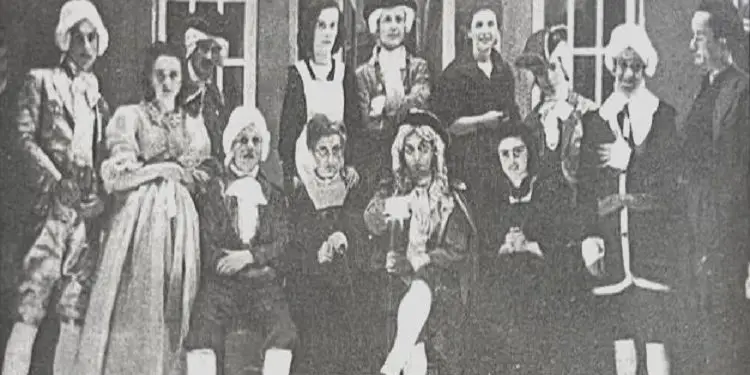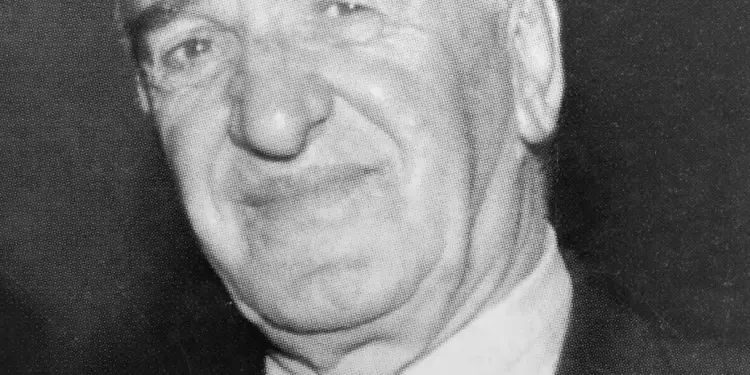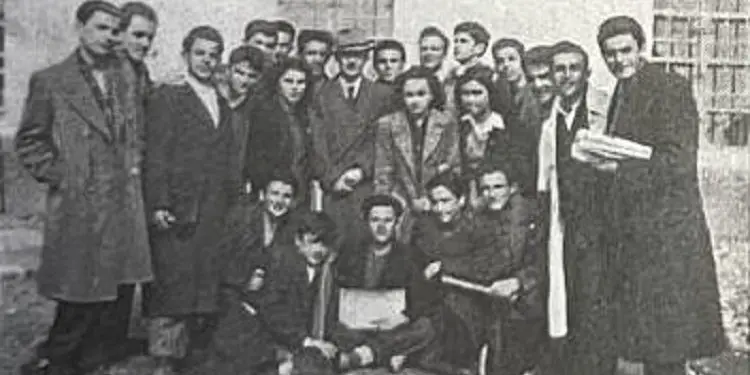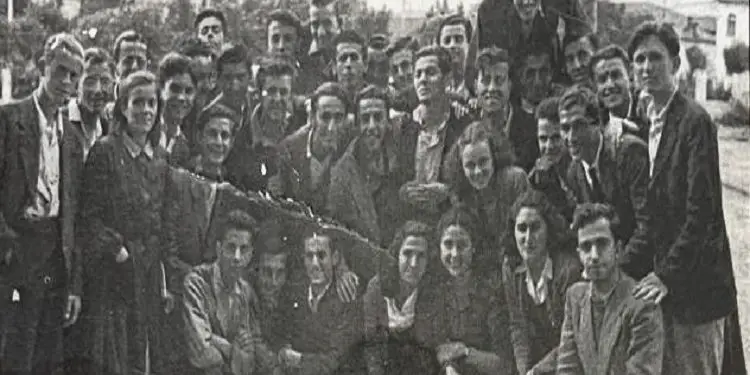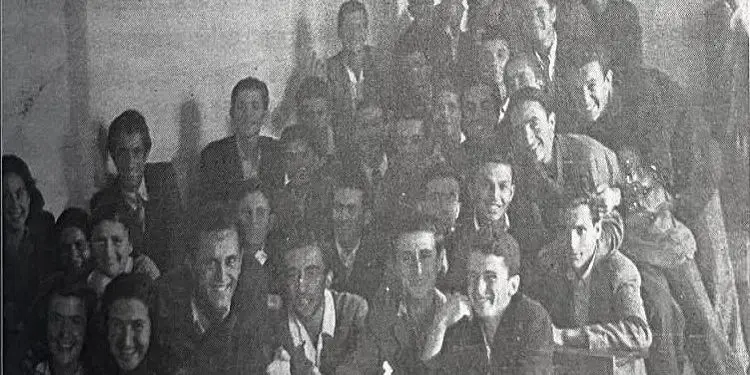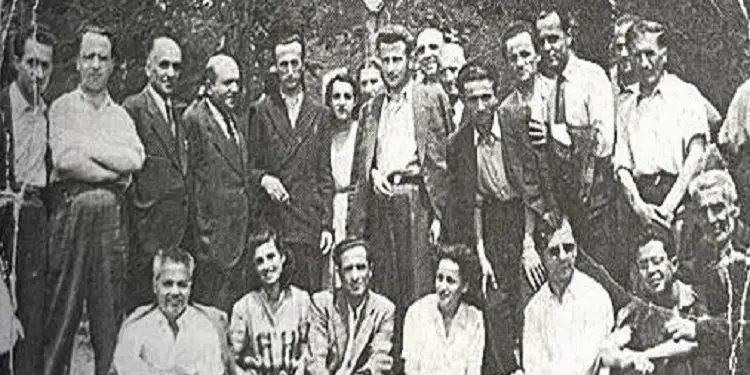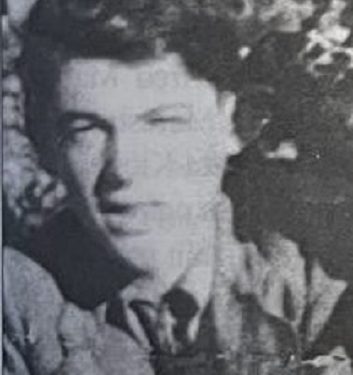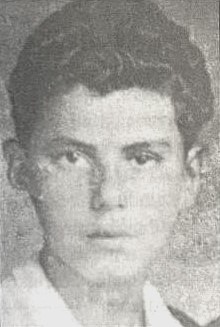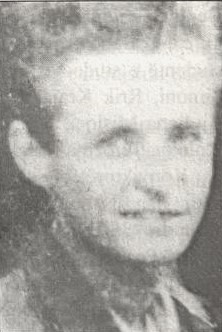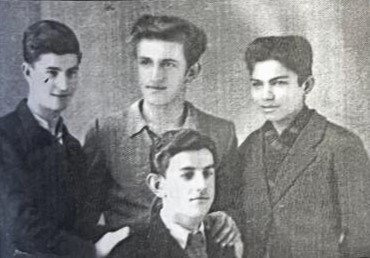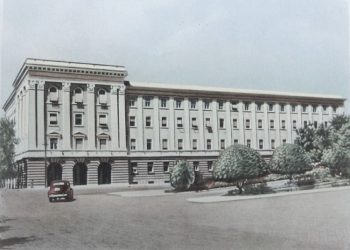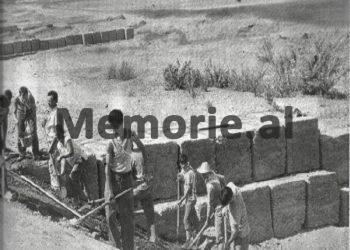By Ahmet Bushati
Part twenty-six
Memorie.al/After the flag was altered in 1944 with the addition of the communist star, Shkodra transformed into a center of resistance against the regime, paying a high price for its tradition of freedom. By April 1945, high school students, already feeling betrayed by the promises of the war, gathered to oppose the new terror that imprisoned and killed innocent people. Communism turned Kosovo into a province of Yugoslavia, while Shkodra was punished for its “historical crime”- its defiance against invaders. The “Postriba Movement” became a tool to suppress all dissent, plunging the city into an unprecedented spiral of suffering: imprisonments, executions, and the destruction of families. The high school students, alongside citizens, became symbols of resistance, while some “young communists” turned into tools of the State Security, leading to expulsions, imprisonments, and internments.
Four times, Shkodra rose in armed rebellion, but history forgot these battles. This book is written to remember the countless prisoners, the tortured, the killed, and the parents who suffered in silence. It is a warning against dictatorship and a plea for future generations not to forget the sacrifices made for freedom.
Continued from the previous issue
In the Footsteps of a Diary
Shkodra in the first years under communism
The Anti-Communist Movement of the Shkodra High School
For this reason, Zef Vila and Agostin Dema managed to secretly take the typewriter of the Shkodra museum directorate, which they immediately sent to Mirdita to Gjon Marka Ndoj. The tracts were constantly conceived by Et’hem Bakalli and were distributed in Shkodra and Tirana, as well as in Kelmend and Mirdita. The tracts from Shkodra would be distributed in Tirana by Ndoc Ljarja, who was a student of the “7 Nandori Technical School”. In addition to Shkodra, tracts were also sent to Tirana from Mirdita. In Malsi, we had distributed and printed the elegy dedicated to Preng Cali, which Zihni Baja had brought from Vukli, when he was a teacher there.
Students grouped in the organization “Albanian Effort” in both periods of its activity, that is, during the life of Bardhosh Dani and even after his death, include: Ismail Baruti, Gjon Marka Ndoj, Viktor Luka Et’hem Bakalli, Nihat Bakalli, Xhevat Gjyrezi, Nexhip Osmani, Bardh Shiroka, Mërgim Dani, Rrok Jubani, Njazi Uruçi, Injac Kujxhia, Ferit Myftia, Pjerin Vata, who without exception would later be arrested and serve years in prison, while members of the organization who were on the run at that time and a little later, would be: Bep Vila, Ali Llukaçi, Lec Vasia, Nihat Bakalli, Zef Shllaku, Donat Rexha, Anica Maloku and perhaps someone else. Ramadan Lumani and Rrik Prendushi, former members of the organization, would be arrested while trying to cross the border.
Former members of the organization, students: Karlet Luka, who would be interned with his family to spend the rest of his life there, and Agostin Dema, Sheuki Anamali, Sheuki Mati, Gjovalin Ujka, Rrik Kraja, Ramadan Sokoli, Shefik Jubica, Beqir Sekniqi, and Hilmi Hoxha, were not imprisoned either. Expelled on that occasion, led by Terezina Baba, one of the most prominent women in our movement, were also these students: Emil Prendushi, Suzana Kraja, Gjovalin Koçi, Kolec Simoni, Rrik Kraja, Çiljeta Simoni, Gjystina Kapedani, Alfred Marashi, Gjyljana Misloci, Madalena Misloci, Lali Glasovi, Albina Marashi, Anisa Maloku, Terezina Dajçi, Gjina Dajçi, Rrexhina Kola, and Marjeta Kiçi.
The dormitory guards, as before, would continue to come from year to year to subdue the rebellious Shkodra students, and the latter would be called the “Party SS”, among whom a certain Peço Filit would stand out above all the others, and so on: Koço Anesti Opari, Alfred Uçi, Nasho Jorgaqi, etc., while Aleksandër Coku had been the dormitory guard who had made a cause with the anti-communist Shkodra students.
Even after the above groups, the spirit of the fight against the dictatorship would continue for several more years in the Shkodra gymnasium. After the students of the “Albanian Effort” organization, a group of other students would also end up in prison, with Muhamet Fejzo, Bernard Dabërdaku, Merxhan Smajli and Leonard Ljarje, to be followed again by another group, consisting of Rauf Uruçi, Xhahid Xhaferi, Sheuqet Kraja, Lin Martini, Qemal Elezi, Ymer Smajli and Ndoc Ndoja.
Two other groups of anti-communist students, but who would not be discovered and who in this way would not even suffer imprisonment, as in the end, would be the one led by Pjeter Filip (Arbnori), Adnan Mukë, Gjovalin Prekë and Bep Juban, and the last one, in 1953, the other with members, Llesh Topallaj, Ali Spahina etc., which would gloriously close the cycle of the eight-year war, which the students of the Shkodra gymnasium had carried out almost without interruption and in extremely difficult conditions, their war with numerous activities and acts of courage and resistance, with over sixty prisoners and with its four martyrs; Bardhosh Dani, Brahim Dërguti, Mark Cacë and Asim Rusi.
We have the opportunity to express once again our respect and gratitude for our honored former professors, for those models of seriousness and exigency, as well as of care and tolerance, who silently, but with visible pain, followed us closely, and who, with their general attitude, were truly a strong moral support for us.
And they were: Rexhep Neziri, Agetina Ashiku, Petro Fundo, Kolë Alimhilli, Gaspër Jakova, Hydajet Ceka, Menduh Agolli, Kolë and Ndoc Kamsi, Filip and Gjina Ndoci, Abdyl and Eqrem Rusi, Adem Bazhdari, Zyhdi Sokoli, Tomor Dani who at that time worked in the high school’s secretariat, and especially, Preng Kaçinari and Qemal Draçini, as long as they were not imprisoned. Our respected professors, without exception, with their attitudes, along with kindness, would constantly reflect a sense of shame that their faces would show that they were holding back.
The “Social Democrat” group, as we mentioned above, had Mark Shllaku as its leader, who would sentence them to death and shoot them. A member of that group would also be Kolec Pikolini, linked to the Mirdita escapees. Kolec’s death sentence would be commuted to life.
One day in 1952, after about three years of being imprisoned, while working as a mechanic in the “Craftsman’s Prison” in Tirana, he would escape and, mountain after mountain, would reach Mirdita and from there to Yugoslavia, to end up one day in the USA.
Another member of this group would be Martin Shyti, who would manage to escape from the investigation, but without saving his life, because in his attempt to cross the border in the Oblikë area, he would be killed. Another member of this group would be Martin Camaj, the future writer and poet, who would escape to Yugoslavia at this time, as well as the handsome, dark-skinned tailor, Isa Beqiri, who would be sentenced to prison.
That last night on the edge of the valley with my father
To our good parents, even when they wanted to be less educated – like my mother’s work, who during the Turkish era had only attended the six-grade Turkish school, called the “Harappan School”, which years later, after independence, would be called the “Parruca School” – or even without school at all, but whose simple and hard-earned life would always lead the day with order and white faces.
They, under a very natural modesty, would instill in themselves great human values. Communism would be a great surprise and hardship for them, denying them any desire for life, but not the obligation to make any sacrifices for their people, as well as for the good name that the house had to preserve in front of a place with such strong traditions, as Shkodra was in those times, so much so that even when they died one day, it would seem to us that they were taking with them a lot of anger and worry for us, that they were leaving us as if in the mouth of a wolf.
As in general in Shkodra, in our house during the winter, the party, especially in the evenings, was held in a small room, as they could gather and close it. That small room, raised by four flights of stairs above the floor level of the house and placed on the side of a large veranda – which must once have had an open nook – with a wide stone staircase that descended from below it to the courtyard, this room, which was said to “gather a courtyard”, i.e., that during the day it brought together the daughters and, sometimes, the wives of the four families who lived there with a large courtyard and under the same roof, while in the evening, it was just us, together with my aunt, with a shared veranda, which again was very small, sixteen.
While the evening of January 19, 1948, was dark and very humid, and when my mother, sisters, grandmother, and two widowed aunts were taking the last steps to move from the large kitchen to that small room – where dinner was regularly eaten and where the party continued until late – suddenly someone intervened and said to me in a low voice: “Ahmet, let’s stay here for a while…”?
We both sat down at the end of the stairs with our backs to the fire, where, without anyone’s care, the last piece of wood continued to burn. It had never happened that my father did not sit in his usual place, there at the top of the altar, on a thick ram “slat” or “post”, placed on a low pedestal that came out flush with the altar, just as it had never happened that he had erased with me that strict line of “demarcation”, which, as a rule, had traditionally divided father and son until then.
We were sitting there, like never before, “my knees were pounding” and “breathing for breath”, which, as unusual as it was, had frightened the people of the house, who were still going back and forth with the work of moving things to the small room, which showed in their pale faces, as well as in their poorly controlled movements. A deep silence, charged with sadness and fear, had covered the people and the house.
Since my two friends, Xhevat and Remzi Quku, had been arrested, my imprisonment had cast its black shadow over all the adults in the house, although out of fear, they had never discussed the matter with me or among themselves. My father, struggling to cover up the deepest shock of his life, had found enough strength in himself to speak to me calmly and without the authority of a parent at that time, and not unlike, but as if he was my older brother.
And the tone of his speech that evening was not only gentle and polite, but also approachable and friendly. Meanwhile, I, knowing from the beginning that the conversation must have had to do with the possibility of my imprisonment, was silently coping with a strong feeling of pity for him and his family.
That afternoon, a policeman from Kavaja who served in the Security Service – a friend of the Juke family since my parents and perhaps even my grandmothers -, where I was married to an aunt – had announced my imminent arrest. My father, believing that that night at home could be my last, was quick to give me the last instructions, which according to him were necessary, and to know and accept my commitment, related to them.
The dialogue between my father and me was short, simple and in complete confidence, consisting more or less of these questions and answers: “Ahmet, have you done anything”? Would be his first question, to which I would answer: “Since we were away, what we did was not a big deal”! And after telling me what he had heard after lunch at the Jukes’ house, he would continue: “Now that they are taking you, what do you plan to do? What do you want to tell them”?!
As if he were very angry, on his forehead, weighed down by suspicious thoughts, he raised his eyebrows in an arch, awaiting my answer, which was: “I have decided not to accept anything.” I had the impression that my father had somehow been freed from the great difficulty of a few moments before, and apparently, having taken heart from my answer, and with his face now open, he would continue: “Yes, my dear Ahmet, so we have to endure, what we can do?”
And he continued: “Aman Ahmet, don’t be a fool, don’t make me think of you as the son of the X effendi who had conquered the world and about whom all of Shkodra is talking today” and as always when he fell into thought, he raised his eyebrows again and shook his head, and also, probably feeling a great parental worry inside, he added: “What are we going to do, what are we going to do”?! Meanwhile, I, trying to be completely honest with him about any unexpected thing that might happen to me in the Security, continued as if with doubt: “A friend told me that one of the tortures they do there is that they cut open the flesh of your thigh with bayonets and then pour salt into the open wound”!
My father, although he did not tempt me with his categorical request, but now with an even gentler tone and a pleading look towards me, would speak to me for the last time: “Aman Ahmet, do not scold us. He has told us now, what should we do, we must endure our own, what we should do, what should we do”!
It was the first time in my life that my father, unlike what he had told me every time I left Shkodër, was not telling me to be careful and to be careful, on the contrary, even though he had me as an only son and who until then had done nothing for me, he, with the stoicism of a citizen who unwaveringly respects the strict codes of tradition, was obliged to push me towards danger, if necessary.
My mother mechanically set the table and I, as if to show that nothing had happened, took my place first and then, without speaking and as if reluctantly, my father and then all of them in turn. Meanwhile, as soon as we started eating, one of the sisters burst into tears, tears and tears, which instantly made everyone who was there cry. The word was spoken, and the sister who had started crying first had disappeared, taking her unstoppable tears with her throughout the house, and, first after her, like her, all the sisters’ one after the other.
Without even a word leaving her mouth, my father left the bread but not the table, while my mother, the grandmother and the two aunts, with tears in their eyes and trembling lips, finally got up from the table. I was the last to get up and together with my mother we ran to the big room where my sisters were already crying, each one more than the other, which actually made me weak, but nevertheless, I managed to contain myself, forcing myself to calm them down with the words: “Stop, don’t do that”! Memorie.al




